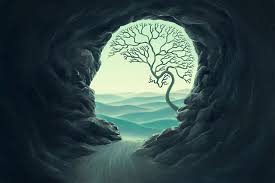Why Do We Dream? The Science Behind Sleep and Imagination 😴💭
By~ Scholar Planet
Created At: 01 Apr, 2025

Introduction: The Mystery of Dreams 🌙✨
Ever woken up from a dream so vivid, it felt more real than reality? Or had one that made absolutely no sense? You’re not alone. For centuries, dreams have fascinated and puzzled us. They've sparked scientific curiosity, artistic inspiration, and philosophical debate. But what really happens when we dream? And why do we do it at all? Let’s explore the captivating world of dreams, the science behind them, and their connection to our imagination. 🧠💡 The Science Behind Dreams 💤🔬
Our sleep isn’t just downtime—it's a journey through various stages, the most fascinating being REM (Rapid Eye Movement) sleep. This is when most dreams take shape, and the brain lights up with activity:
-
The prefrontal cortex, which governs logic and reasoning, slows down—giving way to strange, creative scenarios.
-
The amygdala, our emotional hub, becomes hyperactive—making dreams intense or even bizarrely emotional.
-
The hippocampus, which deals with memory, weaves in fragments of our experiences, thoughts, and feelings.
No wonder dreams often feel like a wild blend of memory, emotion, and pure imagination! 🤯
Why Do We Dream? 🧐🔍
The exact purpose of dreaming remains a mystery, but researchers have uncovered some fascinating possibilities:
1. Memory Management and Learning 🧠📚
While we sleep, our brain reviews the day—strengthening important memories and letting go of the irrelevant. That’s why people say, “Sleep on it”—your brain may be organizing information or even solving problems overnight!
2. Processing Emotions ❤️🎭
Dreams might act as an emotional filter. They give us space to process feelings like stress, joy, grief, or fear, often reflecting what’s going on in our lives—even things we don’t consciously acknowledge.
3. Unlocking Creativity 🎨✨
Ever heard of a great idea being "dreamt up"? That’s because dreams have inspired countless innovations—from Einstein's thought experiments to Mary Shelley’s iconic novel “Frankenstein.” Our dreaming mind thinks outside the box—literally.
4. Preparing for Challenges 🦁⚠️
Some scientists suggest that dreams help us mentally rehearse for dangers—a theory known as the Threat Simulation Hypothesis. Dreaming about running, hiding, or falling could be your brain’s ancient survival mode at work.
What If We Stop Dreaming? 🚫💤
Dreaming isn’t just fun—it’s vital. Lack of REM sleep or disrupted dreaming has been linked to:
-
Heightened stress and mood swings 😡
-
Trouble with focus and memory 🧠
-
Increased anxiety and emotional sensitivity 😟
-
Lower creative thinking and poor problem-solving skills 🤯
Clearly, dreaming is essential for a balanced mind and healthy emotions.
How to Improve Your Dream Life 🌠💡
Want to remember more dreams or even control them? Try these simple strategies:
✅ Prioritize sleep – Aim for 7–9 hours of uninterrupted rest.
✅ Keep a dream journal – Jot down what you remember as soon as you wake up. It helps improve recall and can even lead to lucid dreaming.
✅ Wind down your mind – Meditation or soft music before bed can help shape calmer, more pleasant dreams.
✅ Explore lucid dreaming – With practice, you can become aware you’re dreaming—and maybe even shape your dream world!
Conclusion: Embrace Your Inner Dreamer 🌌✨
Dreams are more than just nighttime stories—they're windows into the workings of your mind. They help us sort through thoughts, express emotions, and tap into creativity in ways we often don’t understand while awake. So the next time you wake up puzzled, inspired, or curious—pay attention. Your dreams might be telling you something powerful.
💬 What’s the wildest or most beautiful dream you’ve ever had? Let’s talk in the comments! 👇The Science of Sleep: How Dreams Form 💤🔬
Our sleep cycle consists of several stages, but dreams mainly occur during Rapid Eye Movement (REM) sleep. This is when our brain becomes highly active, almost as if we are awake! During this stage:
-
The prefrontal cortex (which controls logic) slows down, allowing bizarre and creative dream scenarios.
-
The amygdala (responsible for emotions) becomes highly active, making dreams emotionally intense.
-
The hippocampus (linked to memory) works to store and process new information, sometimes integrating past experiences into dreams.
This is why dreams can be a mix of memories, emotions, and completely random elements! 🤯
Why Do We Dream? 🧐🔍
Scientists have proposed several theories about the purpose of dreams. Some of the most fascinating ones include:
1. Memory Processing and Learning 🧠📚
Dreams may help our brains organize and store memories. Research suggests that while we sleep, our brain strengthens important memories and discards irrelevant ones. Ever heard of “sleep on it” before making a big decision? It turns out, your brain does problem-solving while you snooze!
2. Emotional Regulation ❤️🎭
Dreams might serve as a form of therapy. They allow us to process emotions and deal with stress, anxiety, or trauma. This is why people who experience significant life events often have dreams related to those experiences.
3. Creativity and Imagination Boost 🎨✨
Many great inventions, works of art, and scientific discoveries have been inspired by dreams. Albert Einstein’s theory of relativity was influenced by a dream, and Mary Shelley’s “Frankenstein” was born from a dreamlike vision! This suggests that dreaming enhances creativity and problem-solving skills.
4. Evolutionary Defense Mechanism 🦁⚠️
Some researchers believe dreams help prepare us for potential dangers. This is called the Threat Simulation Theory—our brain simulates challenges so we can react better in real life. Think about how often people dream about falling or being chased—could this be an ancient survival mechanism? 🤔
What Happens If We Don’t Dream? 🚫💤
Dream deprivation can have negative effects on mental and physical health. Studies show that people who are prevented from dreaming experience:
-
Increased stress and irritability 😡
-
Poor memory and concentration 🧠
-
Higher risk of anxiety and depression 😟
-
Reduced creativity and problem-solving ability 🤯
Clearly, dreams play a crucial role in our well-being!
How to Enhance Your Dream Experience 🌠💡
Want to make the most of your dreams? Here are some tips:
✅ Get enough sleep – Aim for 7-9 hours of quality sleep per night.
✅ Keep a dream journal – Writing down your dreams can improve dream recall and even help with lucid dreaming.
✅ Reduce stress – Meditation, reading, or listening to calming music before bed can lead to more positive dreams.
✅ Try lucid dreaming – This is when you become aware that you're dreaming and can even control your dreams!
Conclusion: The Power of Dreams 🌌✨
Dreams remain one of the biggest mysteries of the human mind. Whether they help us process emotions, boost creativity, or prepare us for real-world challenges, one thing is clear—they are essential to our mental and emotional well-being. So next time you wake up from a dream, take a moment to reflect—you never know what insights or inspirations it may hold!
💬 What’s the most fascinating dream you’ve ever had? Share in the comments! 👇
